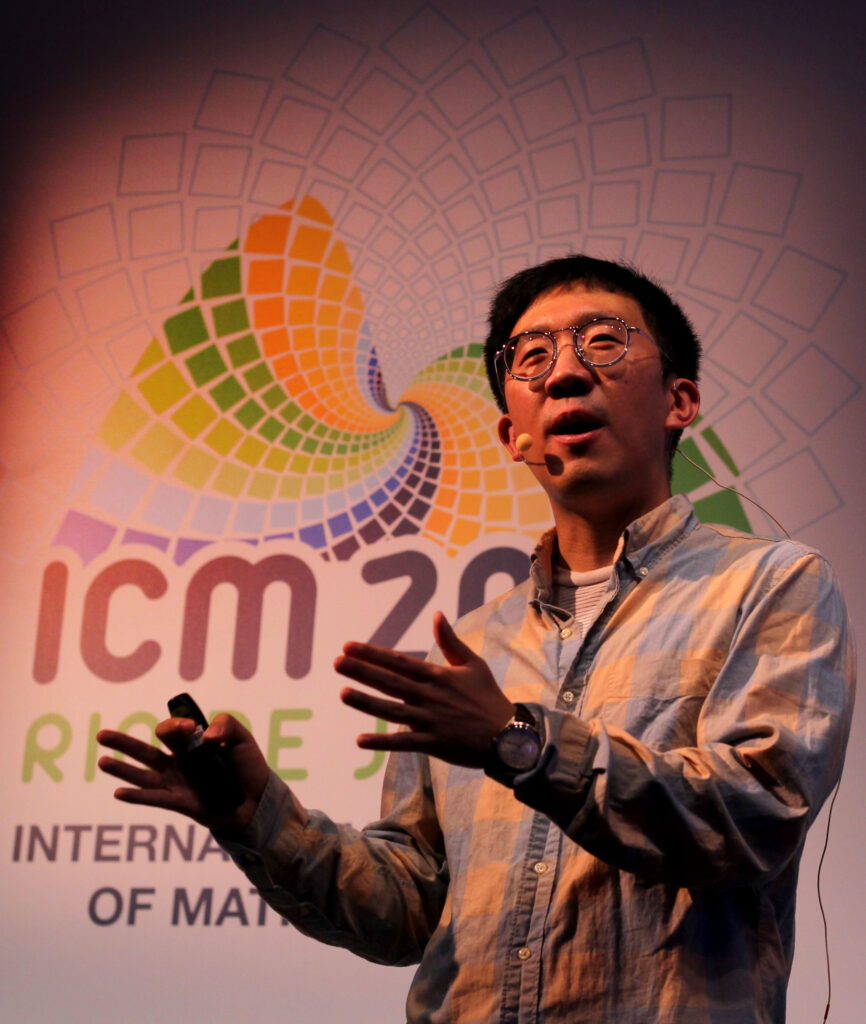This might explain why you are stuck in the “shallow” realm of the map of meaning.

Disclaimer: Please read the brilliant interviews from Quanta Magazine and Simons Foundation to support their original works, I do not own any of the original information about June Huh’s life presented here, I only analyzed it and added my personal thoughts.
I recently learned about the news of one of the freshest Fields medalists (the highest academic honor in Mathematics) — June Huh. Not commenting on anything about Math as an expert (especially not in geometry and combinatorics) but his interviews (1, 2) caught my eyes.
Here are some of Huh’s recounts of his “prequel” to his current life as a Mathematician. According to the interviews, young Huh was a pretty rebellious learner, particularly with respect to standard school curricula. At one point, Huh even developed the defiant habit of copying all the solutions at the back of a workbook, refusing to do it himself. He dropped out of high school eventually. It didn’t seem to help one bit that his father was a teacher of statistics, and his father frankly admitted to giving up on Huh at one point. Math seemed to be far too technical and “un-creative” to Huh.
“When I was young, math was like a far away land surrounded by giant walls that I could not climb”
— Huh (Simons Foundation)
Being sentimental and romantic was his true adolescent side. In his teenage years, he wanted to become a poet and would constantly spend time exploring the mountains near his home to “absorb” nature’s creativity. He would also contemplate, and even weep from the beauty and backstory of good music.
But being so emotionally sensitive has its downside. When he was in college, a place where he called home for an unusually long 6 years, he constantly struggled to stay focused, skipped many classes, and ended up jumping between entirely different academic subjects, just like a restlessly hopping emotional state. It is fair to say being “lost” is his defining characteristic. But being lost also means new opportunities to be explored and discovered.
Finding ways in a lost jungle
The major turning point in his life is defined by his “Lévy walk” into a completely alien experience. During his 6th year wandering in the college, he was one of the 5 students attending an “unusual” class by Dr. Heisuke Hironaka, a former Fields medalist, which Hironaka used to explore his own research in Singularity Theory instead of following a standard curriculum. From this course, Huh learned the true beauty of exploring the vast unknown, undiscovered realm of research mathematics. There he found freedom, not some rigid insurmountable walls. Math has revealed itself to be more fluid and amenable to creativity than he previously thought.
In a twist of fate, he shed the prior labels he gave himself — that he should become a poet, and his childhood pet peeve — Mathematics, has become his newfound source of creativity. He now thinks that math is elegant, truthful, and universal, instead of something narrow that dwells on his “small-self” and emotional volatility.
“In mathematics, you want to know what is true and why it’s true. It’s often hard to go straight from where you are to where you want to go. Each one of us has to find our own way.”
— Huh (Simons Foundation)
Being less emotionally lost means he could finally focus instead of wander, right? It didn’t turn out that his success is now on a clear target within arm’s reach. In fact, he largely inherited his way of wandering from his older self, only now that the exploration is guided by an unyielding truth at a deeper, more focused level. Sure it doesn’t help him to accomplish quick results — but it doesn’t really matter. He knows that deep truth doesn’t come out of a quick search. Here is an interesting remark by his colleague:
“If you talk to him (Huh) for five minutes about some calculus problem, you’d think this guy wouldn’t pass a qualifying exam. He’s very slow.” So slow, in fact, that at first Wang thought they were wasting a lot of time on easy problems they already understood. But then he realized that Huh was learning even seemingly simple concepts in a much deeper way — and in precisely the way that would later prove useful.”
— Botong Wang (Quanta Magazine)
In his own words, he found that forcing himself to define a specific goal and deadline never works. He typically has a focused work time of only 3 hours a day, afterward, his attentive mind would be exhausted. For the rest of the day, he would read historical literature and novels. Although it doesn’t seem like he is actually doing “productive” work, he supposes, the brain is still working and weaving knowledge in the subconscious space, we just have to be patient to let the answer gradually “brew” and reveal itself.
To sum up his story, Huh found his lifelong love and beauty after some detoured but unhindered wanders into the unfamiliar unknowns, and later ascended to his pinnacle after some long, “unproductive” years of slow digging and brewing.
Society’s obsession with fast peakers and quick results

Why is Huh’s story important?
There is something deep about his journey that resonates with me. Huh might seem like a completely lost cause for some twenty years. But later comes a miraculous success that seems completely out of the blue. But is it really out of the blue?
To conceptualize his life journey, he basically spent an immense portion of his life exploring and groping through the murky unknowns, and the slowness of his search further allows him to capture the depth, details, and connection between the places he has visited. Whereas for most people, they’d blaze past most things they consider “uninteresting” after the first glance and then go straight to settle for something easy (and profitable) in their younger, inexperienced years. It is abundantly clear that the former has the potential to do far greater things than the latter by pure reason.
In this way, most people live in a tight black box that caps what they are free to achieve, except for earning quick money. That’s right, the convenient options are often simultaneously the ones perpetuating a problematic status quo i.e., they are merely irreversible low-hanging fruits that generate quick profits but also inequality (oppression) simultaneously. As profitable as it might be in the short term, the chance to achieve truly lasting great things from this mindset is arguably zero.
…
Clearly, modern societies demand and reward “early-peakers” who follow a straight path rather than “late-peakers” or deviant slow wanderers who are often dismissed as failures. Individually, we strive in exams, quickly reopen schools to complete more exams in a pandemic, work 9–5 to earn bread, buy cars, coffees, and take-outs to work more and faster, swipe through hundreds of people on dating apps, and finally rush to have kids when the biological (or cultural?) alarm rings. Culturally, fast-food media took us by storm — “instant” entertainment and gratification from social media (e.g., Instagram, Tiktok), mass media that churn out the maximum amount of sensationalist content, and the “publish-or-perish” game even in academia that claims to explore profound, lasting truths. Globally, GDP and inequality skyrocketed, ecosystems deteriorated exponentially, and numerous wars are lurking to be startled. People who have the courage to get out of this fast-pace rat race are rare, June Huh is one of them but the world needs many more.
“I hope there will be an atmosphere where they can relax and stably pursue long-term projects instead of feeling pressured to come up with findings in the short term.”
— Huh (Arirang News)
The grand quest for knowledge

If you follow my writings about the origin of life and evolution, you know I lean towards the idea that life’s journey is a quest of building a vaster and more connected network, expanding out as a “social conquest”, that’s how eminent biologists like Lynn Margulis and Edward Wilson put it. I think our quest for knowledge and truths can be very much likened to this same journey of life’s evolution. Our best chance to unravel the permeating depth of reality is to dig many branches of paths, connect and conjoin seemingly distinct paths, slowly and carefully, in order to build a vast, stable network of knowledge and collective memory. Only then can we see the light that pierces through the total darkness of unknowns.
“Reality outside our comfort zones is pitch-black. If you don’t explore the unknowns, you will always live without vision, and by extension, without meaning.” — Marmotian
An inconvenient truth is — the majority in a “herd” don’t create novel knowledge and endeavors, they follow others blindly because it is more “comfortable”. If the herd runs in a straight line, they run in a straight line. Moreover, the faster you run in one direction, the harder it is to make a turn and branch out, that’s just inertia. In an analogy borrowing the Red Queen’s race, no matter how fast you (or the society) are trying to run forward, the reality is that your progress is stagnant, and the only fate is collapse after exhaustion. In contrast, if one is smart enough, one would slow down and simply take an alternative path. Ending our obsession with the rat race is an inevitable prerequisite to the success of our quest for true knowledge. Societies really don’t need more people who gravitate quickly towards a comforting path, a convenient reality, or an echo chamber.
I hope this story helps you start appreciating the “boringly” slow and seemingly aimless (but deliberate) explorers because ultimately, they are the ones who can walk farther and penetrate deeper. People might look down on slow wanderers because they can’t understand and predict their next move, humans really don’t like uncertainty after all. Ironically, by being fast racers, we inevitably live under a much thicker cloud of uncertainty all our lives because we can only see one convenient path ahead while the surroundings are all pitch-black. Take home with the mindset that the world isn’t a 100-meter track, nor a circle, it is a maze laced with meandering, inter-connected paths to many jackpots of truth. I hope this gives you the motivation to start a new, slow journey, full of deep exploration and understanding, to illuminate through the pitch-black of uncertainty. Remember, there really is no need to be afraid of being lost.
If you like this story, please subscribe to me and share it far and wide! Support me here and join Medium membership here. To remind you again, credit goes to the brilliant interviews presented by Quanta Magazine and Simons Foundation.
